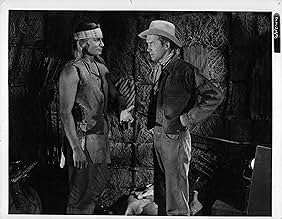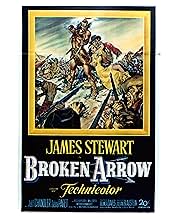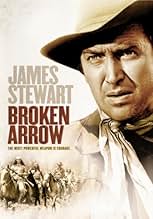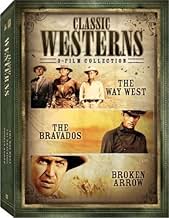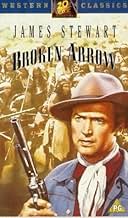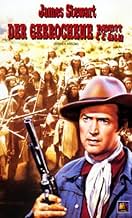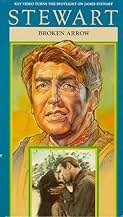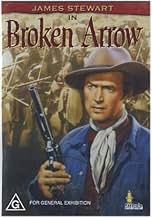IMDb RATING
7.1/10
10K
YOUR RATING
Tom Jeffords tries to make peace between settlers and Apaches in Arizona territory.Tom Jeffords tries to make peace between settlers and Apaches in Arizona territory.Tom Jeffords tries to make peace between settlers and Apaches in Arizona territory.
- Director
- Writers
- Stars
- Nominated for 3 Oscars
- 4 wins & 6 nominations total
Joyce Mackenzie
- Terry
- (as Joyce MacKenzie)
Robert Adler
- Lonergan - Stage Driver
- (uncredited)
Trevor Bardette
- Stage Passenger
- (uncredited)
Chris Willow Bird
- Nochalo
- (uncredited)
Raymond Bramley
- Col. Bernall
- (uncredited)
Chet Brandenburg
- Miner
- (uncredited)
Argentina Brunetti
- Nalikadeya - Cochise's Wife
- (uncredited)
Harry Carter
- Miner
- (uncredited)
Iron Eyes Cody
- Teese
- (uncredited)
J.W. Cody
- Pionsenay - Chosen Warrior
- (uncredited)
Heinie Conklin
- Townsman
- (uncredited)
Dolores Christine Cypert
- American Indian
- (uncredited)
- …
- Director
- Writers
- All cast & crew
- Production, box office & more at IMDbPro
Featured reviews
Broken Arrow was actually the start of James Stewart's return to the western genre. His first western was Destry Rides Again in 1939 and he waited for over 10 years to do another. After that he did them quite regularly.
Broken Arrow was made first, but held up over a year before release so Winchester 73 was actually Stewart's official return to the west. But both films had a lasting impact on his career.
This is the story of Army Captain Tom Jeffords who with a simple act of kindness started a peace process with the Apaches led by their charismatic leader Cochise. Jeffords, a veteran of the Union Army and the frontier wars is heartily sick of the slaughter he's witnessed and participated in. He finds an Indian boy who's been wounded by whites and he tends to them and heals him.
One thing leads to another and pretty soon Jeffords finds himself in the camp of Cochise with whom he strikes up a friendship. He also woos and wins an Apache maid named Sonseehray. Jeffords and Cochise with General Oliver O. Howard make a treaty with the Apache, at least most of them.
Broken Arrow did a lot for James Stewart, but even more for Jeff Chandler who plays Cochise. Cochise was a man in his late 60s when this was really taking place, but Chandler in his prematurely gray hair, portrays him well. Chandler got an Oscar nomination for Best Supporting Actor for Cochise.
Jeffords and Cochise are men of good will and decency who see an honest peace as the only answer. Of course both have to contend with people who won't or can't accept peace with the other race. It's those people and what they do break the peace that is the rest of Broken Arrow's story.
Delmar Daves is a good director of western films and in fact did another film about the U.S. government trying to make peace with another Indian tribe, the Modocs in Oregon, in the film Drumbeat. He gets good results out of the rest of the cast. Note the performances of Will Geer as an Indian hating rancher, Debra Paget as Sonseehray, and Basil Ruysdael as General Howard.
The screenplay was done by Albert Maltz of the Hollywood Ten. How ironic that Maltz was blacklisted after this film. I suppose a film about peace between the races and good will towards one's fellow men was highly subversive.
Broken Arrow was given much acclaim for being the first film to express the view that Indians were something more than bloodthirsty savages. That's not exactly true, other films around that time started saying the same thing. Nevertheless Broken Arrow's message is an eternal one.
Says so in the Scriptures if I'm not mistaken.
Broken Arrow was made first, but held up over a year before release so Winchester 73 was actually Stewart's official return to the west. But both films had a lasting impact on his career.
This is the story of Army Captain Tom Jeffords who with a simple act of kindness started a peace process with the Apaches led by their charismatic leader Cochise. Jeffords, a veteran of the Union Army and the frontier wars is heartily sick of the slaughter he's witnessed and participated in. He finds an Indian boy who's been wounded by whites and he tends to them and heals him.
One thing leads to another and pretty soon Jeffords finds himself in the camp of Cochise with whom he strikes up a friendship. He also woos and wins an Apache maid named Sonseehray. Jeffords and Cochise with General Oliver O. Howard make a treaty with the Apache, at least most of them.
Broken Arrow did a lot for James Stewart, but even more for Jeff Chandler who plays Cochise. Cochise was a man in his late 60s when this was really taking place, but Chandler in his prematurely gray hair, portrays him well. Chandler got an Oscar nomination for Best Supporting Actor for Cochise.
Jeffords and Cochise are men of good will and decency who see an honest peace as the only answer. Of course both have to contend with people who won't or can't accept peace with the other race. It's those people and what they do break the peace that is the rest of Broken Arrow's story.
Delmar Daves is a good director of western films and in fact did another film about the U.S. government trying to make peace with another Indian tribe, the Modocs in Oregon, in the film Drumbeat. He gets good results out of the rest of the cast. Note the performances of Will Geer as an Indian hating rancher, Debra Paget as Sonseehray, and Basil Ruysdael as General Howard.
The screenplay was done by Albert Maltz of the Hollywood Ten. How ironic that Maltz was blacklisted after this film. I suppose a film about peace between the races and good will towards one's fellow men was highly subversive.
Broken Arrow was given much acclaim for being the first film to express the view that Indians were something more than bloodthirsty savages. That's not exactly true, other films around that time started saying the same thing. Nevertheless Broken Arrow's message is an eternal one.
Says so in the Scriptures if I'm not mistaken.
While I have seen better westerns, I was really impressed with Broken Arrow. Not just because it is a very good film, but it is also different. While a lot of westerns deal with themes(some complex, some not so much)such as revenge and betrayal, Broken Arrow is a very poetic and elegiac film that you can see perfectly in how the story is constructed. Also the Indians here are portrayed as those in want of freedom with their families, which I found refreshing, seeing as I have seen them portrayed as quite brutal. Broken Arrow is a beautifully photographed film, the script flows nicely and is thought-provoking and the score is very stirring. The acting is fine, Debra Paget, breathtakingly-beautiful she is, and her scenes with Stewart are touching, is good but I couldn't help thinking they could have cast someone older. James Stewart is very believable in one of his better western performances, while Jeff Chandler gives the best performance of his career here and also the best performance of the movie too. All in all, excellent and very moving film. 8/10 Bethany Cox
In this underrated Western, Stewart is an ex-scout who tries to make peace between the Apaches and the white settlers in 1870s Arizona. For some reason this film's reputation has taken a hit over the years, but it is quite enjoyable. Stewart made several Westerns in the 1950s, starting with this and "Winchester 73" in 1950. Although the latter film is more highly regarded today, this film is actually better crafted, boasting fine cinematography and score. Chandler gives perhaps the best performance of his career as the noble Apache chief who is willing to make peace. Paget (looking like Britney Spears!) plays Stewart's love interest.
Although the story is entertaining and the performances of James Stewart, Jeff Chandler and Debra Paget outstanding, what makes Broken Arrow a landmark film is its portrayal of the Apache Indians as something more than savage killers. Indians in the movies were always seen as brutal and inhuman. Here they are seen as people who want what the "white men" wanted: to live in freedom with their families on their own land and to live their lives in their own way.
Jeff Chandler is terrific as Apache leader Cochise, who he would play twice more in other films. There is a moving scene when they return from battle and he recites the names of those killed with a pained look in his eyes. Cochise and Stewart's character have a relationship which grows from mutual respect to a true friendship as they try to work out peace between the whites and indians. Stewart is looked on as a traitor by his friends and things are complicated further by his relationship with the young Apache girl played by Debra Paget.
I cannot think of another western in which indians have been portrayed as real people with emotions who hurt, who love. When this film was released 50 years ago, blacks, asians and American Indians were still being portrayed using the worst kinds of racial stereotypes.
Jeff Chandler is terrific as Apache leader Cochise, who he would play twice more in other films. There is a moving scene when they return from battle and he recites the names of those killed with a pained look in his eyes. Cochise and Stewart's character have a relationship which grows from mutual respect to a true friendship as they try to work out peace between the whites and indians. Stewart is looked on as a traitor by his friends and things are complicated further by his relationship with the young Apache girl played by Debra Paget.
I cannot think of another western in which indians have been portrayed as real people with emotions who hurt, who love. When this film was released 50 years ago, blacks, asians and American Indians were still being portrayed using the worst kinds of racial stereotypes.
Excellent adaptation of Elliott Arnold's book "Blood Brother" concerning the talk, the need, and the struggle for peace between the white man and the Apache Indians in 1870 Arizona. James Stewart is very effective as a brave former Scout for the Union who used to kill Indians but who now wants the slaughters to stop; he learns their tongue, sends up a smoke signal, and is soon in conference with Cochise himself to allow the U.S. mail-riders safely through Apache terrain...he also finds love with Indian princess Debra Paget, a romance his racist white brothers obviously resent (and at least one Apache soldier as well). Strong, moving story relies on the complicated interpersonal relationships between the characters for its impact, and the performances from Stewart, Paget, and Oscar-nominated Jeff Chandler do not disappoint. Beautifully filmed on rugged locations, Delmer Daves directs a winner, one of the best westerns of its era. *** from ****
Did you know
- TriviaThe broken arrow, which signals an end to fighting, is in fact a Blackfoot Indian symbol, not an Apache symbol. The Blackfoot are native to Montana and Alberta, Canada.
- GoofsWhen General Howard is beginning to pick himself off the ground after the Apache attack on the military wagon train, the first shot shows the ground to be mostly desert sand, with very little vegetation, but when the scene jumps to a long shot of the General getting up, the ground around him is almost entirely covered with green vegetation, showing scarcely any sand at all.
- ConnectionsFeatured in Family Classics: Family Classics: Broken Arrow (1963)
- How long is Broken Arrow?Powered by Alexa
Details
Box office
- Gross worldwide
- $10,145
- Runtime1 hour 33 minutes
- Aspect ratio
- 1.37 : 1
Contribute to this page
Suggest an edit or add missing content



